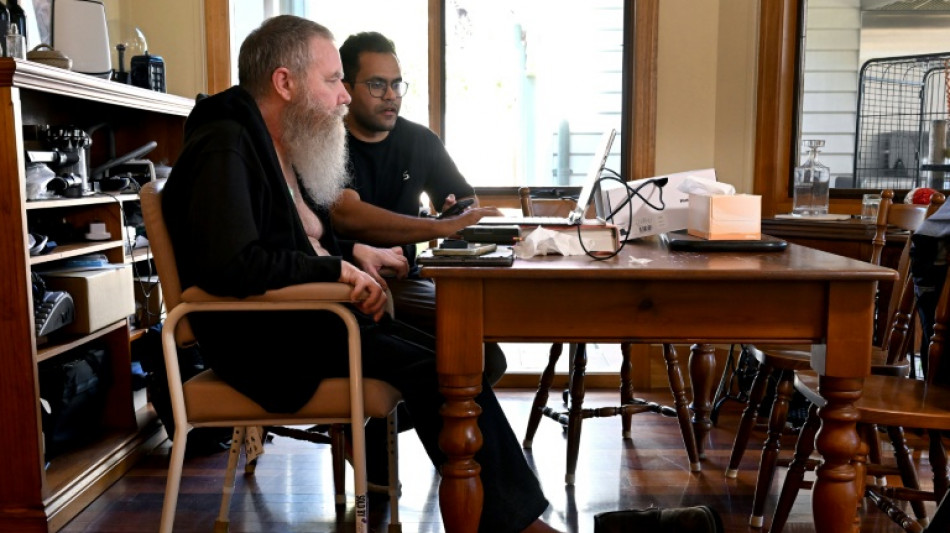
-
 Schwarz breaks World Cup duck with Alta Badia giant slalom victory
Schwarz breaks World Cup duck with Alta Badia giant slalom victory
-
Salah unaffected by Liverpool turmoil ahead of AFCON opener - Egypt coach

-
 Goggia eases her pain with World Cup super-G win as Vonn takes third
Goggia eases her pain with World Cup super-G win as Vonn takes third
-
Goggia wins World Cup super-G as Vonn takes third

-
 Cambodia says Thai border clashes displace over half a million
Cambodia says Thai border clashes displace over half a million
-
Kremlin denies three-way US-Ukraine-Russia talks in preparation

-
 Williamson says 'series by series' call on New Zealand Test future
Williamson says 'series by series' call on New Zealand Test future
-
Taiwan police rule out 'terrorism' in metro stabbing

-
 Australia falls silent, lights candles for Bondi Beach shooting victims
Australia falls silent, lights candles for Bondi Beach shooting victims
-
DR Congo's amputees bear scars of years of conflict

-
 Venison butts beef off menus at UK venues
Venison butts beef off menus at UK venues
-
Cummins, Lyon doubts for Melbourne after 'hugely satsfying' Ashes

-
 'It sucks': Stokes vows England will bounce back after losing Ashes
'It sucks': Stokes vows England will bounce back after losing Ashes
-
Australia probes security services after Bondi Beach attack

-
 West Indies need 462 to win after Conway's historic century
West Indies need 462 to win after Conway's historic century
-
Thai border clashes displace over half a million in Cambodia

-
 Australia beat England by 82 runs to win third Test and retain Ashes
Australia beat England by 82 runs to win third Test and retain Ashes
-
China's rare earths El Dorado gives strategic edge

-
 Japan footballer 'King Kazu' to play on at the age of 58
Japan footballer 'King Kazu' to play on at the age of 58
-
New Zealand's Conway joins elite club with century, double ton in same Test

-
 Australian PM orders police, intelligence review after Bondi attack
Australian PM orders police, intelligence review after Bondi attack
-
Durant shines as Rockets avenge Nuggets loss

-
 Pressure on Morocco to deliver as Africa Cup of Nations kicks off
Pressure on Morocco to deliver as Africa Cup of Nations kicks off
-
Australia remove Smith as England still need 126 to keep Ashes alive

-
 Myanmar mystics divine future after ill-augured election
Myanmar mystics divine future after ill-augured election
-
From the Andes to Darfur: Colombians lured to Sudan's killing fields

-
 Eagles win division as Commanders clash descends into brawl
Eagles win division as Commanders clash descends into brawl
-
US again seizes oil tanker off coast of Venezuela

-
 New Zealand 35-0, lead by 190, after racing through West Indies tail
New Zealand 35-0, lead by 190, after racing through West Indies tail
-
West Indies 420 all out to trail New Zealand by 155

-
 Arteta tells leaders Arsenal to 'learn' while winning
Arteta tells leaders Arsenal to 'learn' while winning
-
Honour to match idol Ronaldo's Real Madrid calendar year goal record: Mbappe

-
 Dupont helps Toulouse bounce back in Top 14 after turbulent week
Dupont helps Toulouse bounce back in Top 14 after turbulent week
-
Mbappe matches Ronaldo record as Real Madrid beat Sevilla

-
 Gyokeres ends drought to gift Arsenal top spot for Christmas
Gyokeres ends drought to gift Arsenal top spot for Christmas
-
Arsenal stay top despite Man City win, Liverpool beat nine-man Spurs

-
 US intercepts oil tanker off coast of Venezuela
US intercepts oil tanker off coast of Venezuela
-
PSG cruise past fifth-tier Fontenay in French Cup

-
 Isak injury leaves Slot counting cost of Liverpool win at Spurs
Isak injury leaves Slot counting cost of Liverpool win at Spurs
-
Juve beat Roma to close in on Serie A leaders Inter

-
 US intercepts oil tanker off coast of Venezuela: US media
US intercepts oil tanker off coast of Venezuela: US media
-
Haaland sends Man City top, Liverpool beat nine-man Spurs

-
 Epstein victims, lawmakers criticize partial release and redactions
Epstein victims, lawmakers criticize partial release and redactions
-
Leverkusen beat Leipzig to move third in Bundesliga

-
 Lakers guard Smart fined $35,000 for swearing at refs
Lakers guard Smart fined $35,000 for swearing at refs
-
Liverpool sink nine-man Spurs but Isak limps off after rare goal

-
 Guardiola urges Man City to 'improve' after dispatching West Ham
Guardiola urges Man City to 'improve' after dispatching West Ham
-
Syria monitor says US strikes killed at least five IS members

-
 Australia stops in silence for Bondi Beach shooting victims
Australia stops in silence for Bondi Beach shooting victims
-
Olympic champion Joseph helps Perpignan to first Top 14 win despite red card


ALS patient pioneering brain-computer connection
As a rare form of Lou Gehrig's disease paralyses his body, Rodney Gorham hopes a pioneering link between his brain and a computer will help others after he is gone.
The 63-year-old Australian shared his thoughts by using his eyes to pinpoint letters on a screen and "clicking" on words with his mind.
Thanks to an eight-millimetre stent implanted in his brain to detect neural activity, Gorham hopes to continue going online, sending messages and playing video games for a long time to come.
US company Synchron has been testing the "stentrode" for the past two years, getting cleared for human trials before Elon Musk's attention-grabbing Neuralink startup.
Gorham's implant connects to a small receiver and transmitter unit under the skin in his chest, and he credits it with changing his life.
Several years ago, Gorham was diagnosed with ALS, which causes progressive paralysis of the respiratory muscles, trunk, arms and legs.
The disorder is expected to gradually disable his movement, but not to kill him, according to his wife, Carolyn.
"So he could live for another 20 years. So think about if your body didn't move at all, your brain still firing at the same rate," she said.
"And you can't scratch your nose. You can't tell somebody you want to scratch your nose."
The brain implant gives her husband a "slice of life", letting him at least communicate or play a game, Carolyn Gorham added.
Rodney Gorham has given up on video games that require quick reactions typically made with handheld controllers or a computer mouse, but is still playing turn-based ones such as city-building games, according to his wife.
Without the experimental technology, the life of the sports car- and travel-loving former salesman "would be pure torture", Carolyn Gorham said.
- Language of the mind -
Synchron hopes to get approval next year from health authorities to market a final version of the device.
The startup said clinical tests have been conclusive but there is still a lot of work to do, notably in decoding brain signals and translating them into a universal language to command computers.
While eye-tracking tech enables a patient to target icons on a computer screen, the user must think of a motion -- like kicking their foot or making a fist -- to "click" an icon.
The software must be trained to recognise the brain signal that sends the command to the body, but people's minds "speak" in different ways.
Computers need a common neural language to understand the intent no matter who is thinking it, Synchron founder Tom Oxley said from his office in New York.
"That's a very interesting challenge we are facing now," Oxley told AFP.
"Building a system that is not just for one person, but for millions of people."
At his home in Melbourne, Rodney Gorham tells an AFP journalist that he was able to quickly learn to type using his mind.
While going through exercises to tune the software, he moves his feet as instructed. His hand moves an imaginary computer mouse on a tabletop.
At the start of the trial it took about two and a half seconds for Gorham's thoughts to prompt an on-screen click, but now it's a half second, Synchron engineer Zafar Faraz recalled while sitting next to the patient.
- Independence -
Gorham's contribution to improving the brain-computing interface has been "monumental", according to Faraz.
"I don't think we would be anywhere if he hadn't taken the brave step of volunteering and pioneering this technology," Faraz said.
Families of patients testing brain implants proudly compare them to astronauts bravely exploring a new world, said David Putrino, who oversees the stentrode's clinical testing in the United States and is director of rehabilitation innovation at New York's Mount Sinai Health System.
"We select patients who hope to advance science for others more than for themselves," Putrino told AFP.
The doctor sees implants like stentrodes improving overall health of patients whose conditions drastically limit social interaction, leaving them isolated.
"Recent studies show that solitude has the same effect on health as smoking 17 cigarettes a day," Putrino said.
The technology remains far from enabling real conversations, but it gives her husband much-needed autonomy, Carolyn Gorham said.
"Without the software... his life would be torture. I think that's the only way to describe it. It would be hell on earth.
"With this software the freedom that it will give him, just to be able to make decisions and look at things without asking somebody to do it for them. Just that little bit of independence is incredible."
J.Oliveira--AMWN



